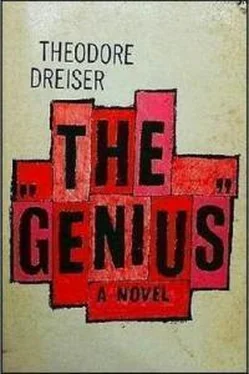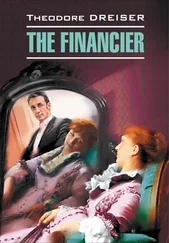Теодор Драйзер - The Genius
Здесь есть возможность читать онлайн «Теодор Драйзер - The Genius» весь текст электронной книги совершенно бесплатно (целиком полную версию без сокращений). В некоторых случаях можно слушать аудио, скачать через торрент в формате fb2 и присутствует краткое содержание. Год выпуска: 2014, Издательство: epubBooks Classics, Жанр: Классическая проза, на английском языке. Описание произведения, (предисловие) а так же отзывы посетителей доступны на портале библиотеки ЛибКат.
- Название:The Genius
- Автор:
- Издательство:epubBooks Classics
- Жанр:
- Год:2014
- ISBN:нет данных
- Рейтинг книги:4 / 5. Голосов: 1
-
Избранное:Добавить в избранное
- Отзывы:
-
Ваша оценка:
- 80
- 1
- 2
- 3
- 4
- 5
The Genius: краткое содержание, описание и аннотация
Предлагаем к чтению аннотацию, описание, краткое содержание или предисловие (зависит от того, что написал сам автор книги «The Genius»). Если вы не нашли необходимую информацию о книге — напишите в комментариях, мы постараемся отыскать её.
The Genius — читать онлайн бесплатно полную книгу (весь текст) целиком
Ниже представлен текст книги, разбитый по страницам. Система сохранения места последней прочитанной страницы, позволяет с удобством читать онлайн бесплатно книгу «The Genius», без необходимости каждый раз заново искать на чём Вы остановились. Поставьте закладку, и сможете в любой момент перейти на страницу, на которой закончили чтение.
Интервал:
Закладка:
"Oh, no, I haven't," she replied. "You can paint, and you can write"—she was judging by some of the booklets about Blue Sea and verses about herself and clippings of articles done in his old Chicago newspaper days, which he showed her once in a scrapbook in his apartment—"and you can run that office, and you were an advertising manager and an art director."
She lifted up her face and looked into his eyes admiringly.
"My, what a list of accomplishments!" he replied. "Well whom the gods would destroy they first make mad." He kissed her.
"And you love so beautifully," she added by way of climax.
Since then, she had thought of this often, but now, somehow, it received a severe setback. He was not quite so powerful. He could not prevent her mother from doing this, and could she really conquer her mother? Whatever Suzanne might think of her deceit, she was moving Heaven and earth to prevent this. Was she wholly wrong? After that climacteric night at St. Jacques, when somehow the expected did not happen, Suzanne had been thinking. Did she really want to leave home, and go with Eugene? Did she want to fight her mother in regard to her estate? She might have to do that. Her original idea had been that she and Eugene would meet in some lovely studio, and that she would keep her own home, and he would have his. It was something very different, this talk of poverty, and not having an automobile, and being far away from home. Still she loved him. Maybe she could force her mother to terms yet.
There were more struggles in the two or three succeeding days, in which the guardian of the estate—Mr. Herbert Pitcairn, of the Marquardt Trust Company, and, once more, Dr. Woolley, were called in to argue with her. Suzanne, unable to make up her mind, listened to her mother's insidious plea, that if she would wait a year, and then say she really wanted him, she could have him; listened to Mr. Pitcairn tell her mother that he believed any court would on application adjudge her incompetent and tie up her estate; heard Dr. Woolley say in her presence to her mother that he did not deem a commission in lunacy advisable, but if her mother insisted, no doubt a judge would adjudge her insane, if no more than to prevent this unhallowed consummation. Suzanne became frightened. Her iron nerve, after Eugene's letter, was weakening. She was terribly incensed against her mother, but she began now for the first time to think what her friends would think. Supposing her mother did lock her up. Where would they think she was? All these days and weeks of strain, which had worn her mother threadbare had told something on her own strength, or rather nerve. It was too intense, and she began to wonder whether they had not better do as Eugene suggested, and wait a little while. He had agreed up at St. Jacques to wait, if she were willing. Only the provision was that they were to see each other. Now her mother had changed front again, pleading danger, undue influence, that she ought to have at least a year of her old kind of life undisturbed to see whether she really cared.
"How can you tell?" she insisted to Suzanne, in spite of the girl's desire not to talk. "You have been swept into this, and you haven't given yourself time to think. A year won't hurt. What harm will it do you or him?"
"But, mama," asked Suzanne over and over at different times, and in different places, "why did you go and tell Mr. Colfax? What a mean, cruel thing that was to do!"
"Because I think he needs something like that to make him pause and think. He isn't going to starve. He is a man of talent. He needs something like that to bring him to his senses. Mr. Colfax hasn't discharged him. He told me he wouldn't. He said he would make him take a year off and think about it, and that's just what he has done. It won't hurt him. I don't care if it does. Look at the way he has made me suffer."
She felt exceedingly bitter toward Eugene, and was rejoicing that at last she was beginning to have her innings.
"Mama," said Suzanne, "I am never going to forgive you for this. You are acting horribly—I will wait, but it will come to the same thing in the end. I am going to have him."
"I don't care what you do after a year," said Mrs. Dale cheerfully and subtly. "If you will just wait that long and give yourself time to think and still want to marry him, you can do so. He can probably get a divorce in that time, anyhow." She did not mean what she was saying, but any argument was good for the situation, if it delayed matters.
"But I don't know that I want to marry him," insisted Suzanne, doggedly, harking back to her original idea. "That isn't my theory of it."
"Oh, well," replied Mrs. Dale complaisantly, "you will know better what to think of that after a year. I don't want to coerce you, but I'm not going to have our home and happiness broken up in this way without turning a hand, and without your stopping to think about it. You owe it to me—to all these years I have cared for you, to show me some consideration. A year won't hurt you. It won't hurt him. You will find out then whether he really loves you or not. This may just be a passing fancy. He has had other women before you. He may have others after you. He may go back to Mrs. Witla. It doesn't make any difference what he tells you. You ought to test him before you break up his home and mine. If he really loves you, he will agree readily enough. Do this for me, Suzanne, and I will never cross your path any more. If you will wait a year you can do anything you choose. I can only hope you won't go to him without going as his wife, but if you insist, I will hush the matter up as best I can. Write to him and tell him that you have decided that you both ought to wait a year. You don't need to see him any more. It will just stir things all up afresh. If you don't see him, but just write, it will be better for him, too. He won't feel so badly as he will if you see him again and go all over the ground once more."
Mrs. Dale was terribly afraid of Eugene's influence, but she could not accomplish this.
"I won't do that," said Suzanne, "I won't do it. I'm going back to New York, that's all there is about it!" Mrs. Dale finally yielded that much. She had to.
There was a letter from Suzanne after three days, saying that she couldn't answer his letter in full, but that she was coming back to New York and would see him, and subsequently a meeting between Suzanne and Eugene at Daleview in her mother's presence—Dr. Woolley and Mr. Pitcairn were in another part of the house at the time—in which the proposals were gone over anew.
Eugene had motored down after Mrs. Dale's demands had been put before him in the gloomiest and yet more feverish frame of mind in which he had ever been,—gloomy because of heavy forebodings of evil and his own dark financial condition—while inspirited at other moments by thoughts of some splendid, eager revolt on the part of Suzanne, of her rushing to him, defying all, declaring herself violently and convincingly, and so coming off a victor with him. His faith in her love was still so great.
The night was one of those cold October ones with a steely sky and a sickle moon, harbinger of frost, newly seen in the west, and pointed stars thickening overhead. As he sat in his car on the Staten Island ferry boat, he could see a long line of southward bound ducks, homing to those reedy marshes which Bryant had in mind when he wrote "To a Waterfowl." They were honking as they went, their faint "quacks" coming back on the thin air and making him feel desperately lonely and bereft. When he reached Daleview, speeding past October trees, and entered the great drawing–room where a fire was blazing and where once in spring he had danced with Suzanne, his heart leaped up, for he was to see her, and the mere sight of her was as a tonic to his fevered body—a cool drink to a thirsting man.
Читать дальшеИнтервал:
Закладка:
Похожие книги на «The Genius»
Представляем Вашему вниманию похожие книги на «The Genius» списком для выбора. Мы отобрали схожую по названию и смыслу литературу в надежде предоставить читателям больше вариантов отыскать новые, интересные, ещё непрочитанные произведения.
Обсуждение, отзывы о книге «The Genius» и просто собственные мнения читателей. Оставьте ваши комментарии, напишите, что Вы думаете о произведении, его смысле или главных героях. Укажите что конкретно понравилось, а что нет, и почему Вы так считаете.









